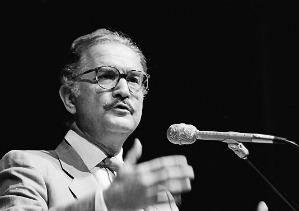Carlos Fuentes – Old Soldiers Never Die
 By D. C. Basset, Voxxi
By D. C. Basset, Voxxi
General Douglas MacArthur said in his farewell speech in 1951 that old soldiers never die; they just fade away. It is the same with writers and artists, they never die, and they do not even fade away. They stay with us and leave the legacy of their thoughts on the printed page.
We can recreate their prose, their style, their ideas for as long as we live, reaching out to newer and younger generations. They are called classics. And all those who stay behind become the inheritors of their production. Each time we open a book by Carlos Fuentes, for example, we recreate his ideas, we commune with a writer who is no longer alive in the flesh, but whose thought will endure as long as humanity endures.
Carlos Fuentes Macías, Panamá City, November 11, 1928 – Mexico, 15 May, 2012, was a Mexican man-of-the-world. Son of a diplomat, he spent his childhood in different cities –Montevideo, Rio de Janeiro, Buenos Aires, Washington, Quito…- he became a diplomat himself, being ambassador to London and Paris, representing Mexico.
He taught at Harvard, Princeton, Brown, Pennsylvania, Columbia and Cambridge.
What else? At the age of thirty he published his first novel La región más transparente, which became a classic, where the Spanish, the indigenous and the mestizo mix, depicting life in the City of Mexico and the culture of the country in general.
His 1984 novel, Gringo viejo, was filmed as Old Gringo, with Gregory Peck and Jane Fonda. The book hit the US best-seller list.
Premio Rómulo Gallegos, Cervantes Prize, Príncipe de Asturias Award, Gran Cruz de la Orden de Isabel la Católica and since 2001 a member of the Academia Mexicana de la Lengua. All except the Nobel Prize, but we all know that award is like the lottery, if not more whimsical.
He is one of the best-known Spanish-language writers in the world today, and rightly so. That is why I said at the onset that writers of his stature do not die or fade away: they stay with us, giving us what we sometimes call culture, which he tried to capture in his fiction and essays. In his case he was able to mesmerize the American English-speaking readership, a difficult market whose attention to hold.
He was a sharp critic of Mexico and the US, who never minced words, and was very outspoken. He was once denied entry into the US, but many other writers have had that honor bestowed upon them also.
He carried a life-long love affair with language and words. Being one of Mexico’s greatest living authors, we have a good excuse now to take up one of his novels:
 La muerte de Artemio Cruz, by Carlos Fuentes
La muerte de Artemio Cruz, by Carlos FuentesLa voluntad y la fortuna (Destiny and Desire)
La frontera de cristal (The Crystal Frontier)
Cristóbal Nonato (Christopher Unborn)
La muerte de Artemio Cruz (The Death of Artemio Cruz)
Gringo viejo (Old Gringo)
“Los sajones nunca dicen lugares comunes. –Por eso me gustan los latinos.” (Anglos never use trite expressions. That is why I like Latinos. Carlos Fuentes, Cantar de ciegos, 1964.
Read his novels and let him talk to you. And listen hard.
You may follow D.C. Basset on Twitter
This article first appeared in Voxxi.
[Photo by MDCarchives]
